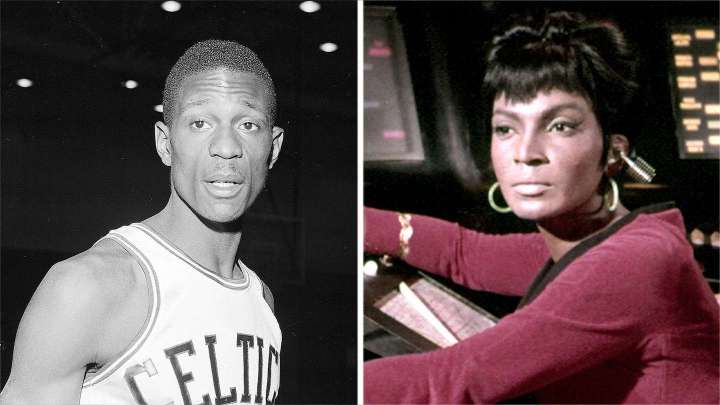We lost two of my childhood heroes on Sunday, two indomitable members of the generation of Black pioneers who both, in their separate fields, changed the cultural landscape of the nation.
Farewell to two members of Black America’s greatest generation

Russell, who died at 88, and Nichols, who was 89, both received personal support and encouragement from the Rev. Martin Luther King Jr. Russell stood prominently — at just two inches shy of seven feet tall, that was the only way he could stand — at the 1963 March on Washington for Jobs and Freedom, where King gave the “I Have a Dream” speech. And King talked Nichols out of quitting the sci-fi series, telling her simply: “You cannot do that.”
First, consider Russell. He was my father’s favorite basketball player, and we would sit together in front of our black-and-white set and watch as Russell’s Boston Celtics won championship after championship — 11 in all, including an incredible eight in a row between 1959 and 1966.
Of course there were other towering Black stars in the NBA, among them Russell’s great rival, Wilt Chamberlain. But what set Russell apart was that he played more with his brain than with his body. He was a defensive genius, studying opponents’ tendencies so he could best neutralize them. He made rebounding into a science, anticipating how the ball would carom off the rim or backboard so he could get there first. My dad and I marveled at how he could block the taller, stronger Chamberlain’s shots — and not just swat the ball away but tip it purposefully toward a teammate.
Even more important, to a young Black kid growing up in the South, was that the Celtics were Russell’s team, period. When he was on the floor, he ran the action. And when legendary coach Red Auerbach stepped away, Russell became both the team’s most indispensable player and its head coach — the first African American coach in a major American sports league. In that dual role, he led the Celtics to two more championships.
Follow Eugene Robinson‘s opinions
FollowRussell also won two NCAA championships and an Olympic gold medal. He did not suffer fools gladly — interviewers of the day described him as prickly. He had infinite patience for the fight for racial justice, but no patience at all for anyone who tried to put him in a pigeonhole.
And he was brave. He endured racial taunts, even at home games, and despite his stardom had trouble buying a house in some areas of Boston because of his race. Intruders once broke into his home while he and his family were away, spray-painting racist epithets on the walls and defecating on his bed. His response was to keep winning. In 2011, President Barack Obama awarded him the Presidential Medal of Freedom.
Now consider Nichols. In her own way, she was every bit as important a pioneer. When “Star Trek” debuted in 1966, she was not the first Black actor to appear on network television. But the role of Uhura was not a “Black” role. She was just like any other well-trained, supremely competent officer on the bridge of the starship Enterprise. Americans had never before seen images of a Black woman in that context beamed into their living rooms. In my house, “Star Trek” was must-see television — not because of Captain Kirk or Mr. Spock, but because of Lt. Uhura.
Nichols had decided to leave the show after the first season to star in a Broadway play, but before making her departure final, she went to an NAACP banquet where she was told that a special fan wanted to meet her. “I looked across the way and there was the face of Dr. Martin Luther King smiling at me and walking toward me,” she told NPR in 2011.
When she told King she was quitting “Star Trek,” he forbade it. “For the first time, we are being seen the world over as we should be seen,” Nichols said King told her. “He says, ‘Do you understand that this is the only show that my wife Coretta and I will allow our little children to stay up and watch?’ I was speechless.”
Nichols went on to become a longtime goodwill ambassador for the U.S. space program, successfully encouraging minorities and women to become astronauts.
The battles we have to fight today seem small compared to the wars Russell and Nichols waged and won. They were part of Black America’s greatest generation. We thank them for their courage.






